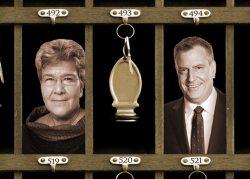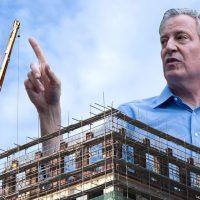Developers forecast that restrictions on hotel development would have a chilling effect. Conditions, so far, are pretty icy.
In the 365 days since the city required special permits to build a hotel, not a single application for one has been filed.
While building permits have been sought and issued for new hotels, they appear to be for projects exempt from the law or grandfathered under the old rules, according to an analysis of Department of Buildings data by The Real Deal.
Hotel projects — which previously were allowed in commercial districts without having to jump through political hoops — abounded as city tourism boomed from the turn of the century until the pandemic.
Leading up to the law’s passage, proponents argued that a special permit would help avoid an oversaturation of hotels and prevent projects that would disrupt residential neighborhoods. Critics countered that the bill lacked any land use rationale, and would sap an industry already weakened by the pandemic.
Obtaining a special permit is no small task. It involves going through the city’s Uniform Land Use Review Procedure, or Ulurp, an expensive and months-long process that culminates in a City Council vote. Council members are subject to pressure from constituents and from the Hotel Trades Union, which lobbied for the permit requirement to curb the proliferation of nonunion hotels.
By the Department of City Planning’s own analysis, by 2035, the permit mandate will leave New York 47,000 hotel rooms short of the demand. While it is challenging to isolate the effects of the law from those of other economic conditions, hotel projects also dried up in light manufacturing zones after special permit restrictions were enacted there in 2018.
Read more


Attorney Eugene Travers of Kramer Levin said a few developers he represents are considering applying for a special permit to build hotels. But with projects now complicated by economic conditions such as rising construction costs and interest rates, the extra costs and time involved in getting a special permit are especially unappealing.
Even without the extra political approval and the threat of a recession, it can be difficult to secure financing for hotels.
“All things considered, it is currently more lucrative to explore investing and turning around a distressed asset, versus trying to reposition or develop one through the special permit process,” said Yariv Ben-Ari, co-chair of Herrick’s real estate hospitality group.
The permit requirement did make a winner of hotel projects that were underway when the law took effect or were otherwise exempted. They now have a few years, and potentially longer, without any new competition.
But the bigger winner was the Hotel Trades Council. Because City Council members now have the final say over a project, the politically influential union would push them to make approval conditional on the developer’s not opposing a union organizing drive.
An official from the union noted that unlike agreements that mandate that union labor is hired to construct a building, special permits do not guarantee that a hotel’s workforce will be unionized.
“That process takes weeks to mature after a project is completed and the union has gone through the process of educating, organizing, and winning worker approval to join the union,” the official said.
The union also pointed to the drop in tourism in the city, saying the market doesn’t currently support new hotel developments, regardless of special permit requirements. The union asserted that the special permit mandate will not deter projects once the market returns, and that it puts hotel development on an equal footing with land use actions that require Council approval.
“The appetite to go through Ulurp is certainly there for the right project,” another union official said.
However, no one is predicting a return to the scale of hotel development that predated the law. Many of those projects were by developers who avoid the political gauntlet that special permits entail.
The union has logged other lobbying victories. A 2021 measure to allow the conversion of hotels and office buildings into affordable housing grants the union veto power over such projects. Hotel Trades blocked conversion of the Paramount Hotel on West 46th Street, according to City Limits.
By the same token, plans for a union-staffed hotel would enjoy Hotel Trades’ support. But Travers said if special permit applications ever do move forward, the requirement could backfire on the union — and put politicians in a tough spot.
“The City Council may find themselves in a difficult position where they have a hotel where the unions support it but the community opposes it,” he said. “The stated rationale of the need for the special permit is that hotels sometimes conflict with surrounding residential neighborhoods.”
